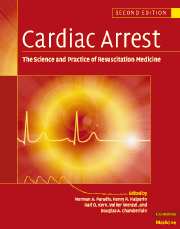Book contents
- Frontmatter
- Contents
- List of contributors
- Foreword
- Preface
- Part I Introduction
- Part II Basic science
- Part III The pathophysiology of global ischemia and reperfusion
- Part IV Therapy of sudden death
- Part V Postresuscitation disease and its care
- Part VI Special resuscitation circumstances
- Part VII Special issues in resuscitation
- 66 The ethics of resuscitation and end of life decisions
- 67 The economics of treating sudden cardiac arrest
- 68 Medicolegal aspects
- 69 The near-death experience, long-term psychological outcomes and support of survivors
- 70 CPR training
- 71 Consensus development in resuscitation: the growing movement towards international emergency cardiovascular care guidelines
- Index
69 - The near-death experience, long-term psychological outcomes and support of survivors
from Part VII - Special issues in resuscitation
Published online by Cambridge University Press: 06 January 2010
- Frontmatter
- Contents
- List of contributors
- Foreword
- Preface
- Part I Introduction
- Part II Basic science
- Part III The pathophysiology of global ischemia and reperfusion
- Part IV Therapy of sudden death
- Part V Postresuscitation disease and its care
- Part VI Special resuscitation circumstances
- Part VII Special issues in resuscitation
- 66 The ethics of resuscitation and end of life decisions
- 67 The economics of treating sudden cardiac arrest
- 68 Medicolegal aspects
- 69 The near-death experience, long-term psychological outcomes and support of survivors
- 70 CPR training
- 71 Consensus development in resuscitation: the growing movement towards international emergency cardiovascular care guidelines
- Index
Summary
Since the 1950s and 1960s improvements in resuscitation techniques have led to improved survival for patients following cardiac arrest. Although many studies have focused on prevention and acute medical treatment of cardiac arrest, relatively few have studied cognitive functioning during and after this event. Nevertheless, this is one of the most intriguing aspects of cardiopulmonary resuscitation. Much of the work in this area has evolved from the finding that a proportion of cardiac arrest survivors report thought processes, reasoning, and memory formation that are consistent with previously described near-death experiences. These experiences are reported to have occurred at a time during cardiac arrest when consciousness appears to be absent. The first part of this chapter thus focuses on the history and phenomenology of near-death experiences, their relationship to cardiac arrest and current explanations for the experiences. We then review the longer-term psychological outcomes of surviving a cardiac arrest, as well as the impact of having a near-death experience on long-term quality of life. Finally we review the wider potential philosophical implications of research into near-death experiences during cardiac arrest.
History of near-death experiences
Although modern heart and lung resuscitation methods were established in the 1950s and 1960s, there is a long history, going back centuries, of attempts to resuscitate people after they had become ‘lifeless '. These involved using warm ash and hot water, whipping, blowing hot smoke in the mouth and rectum, as well as rolling people back and forth on a wine barrel or a horse to help the chest expand and take air in. The outcome of these methods was understandably poor.
- Type
- Chapter
- Information
- Cardiac ArrestThe Science and Practice of Resuscitation Medicine, pp. 1244 - 1257Publisher: Cambridge University PressPrint publication year: 2007



